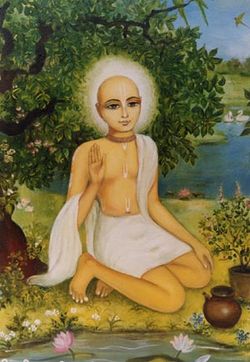Jiva Goswami (1513-1598)[1] was the son of Shri Vallabha and nephew of Shri Sanatana, Shri Rupa, all of whom were employed in the service of the Badsha Hussein Shah. Having been rewarded richly by the Badsha for their devices, their household life was very opulent.[2]
Contents
Early Life
In his studies the young Jiva excelled in all subjects, especially Sanskrit grammar, poetry and rhetoric. When he learned that his two uncles had taken to the path of renunciation and that his father had passed away, Shri Jiva journeyed to Navadvipa in order to get the mercy of Lord Nityananda. When he arrived in Navadvipa Lord Nityanananda introduced Jiva to all the associates of Mahaprabhu including Saci-devi and Shrivasa Thakura and proceeded to take him on parikrama of Navadvipa-dhama. On the order of Nityananda, Shri Jiva went on to Varanasi to study Vedanta from Madhusudana Vacaspati, a disciple of Sarvabhauma Bhattacarya who had heard from his guru the divine explanations of Shrimad Bhagavatam that he had received from Shri Chaitanya Mahaprabhu. Jiva mastered the same conclusions and then set out for Vrindavana to join his uncles Shri Rupa and Shri Sanatana.[3]
Proof Reader
Seeing that Jiva had quickly become conversant with the conclusion of Shrimad-Bhagavatam, Shri Rupa engaged him in proof-reading his Bhakti-rasamrita-sindhu. At this time Shri Jiva compiled a commentary on Bhakti-rasamrita-sindhu called Durgama-sangamani. Shri Sanatana Goswami compiled Shri Vaishnava-tosani, a commentary on the tenth canto of Shrimad-Bhagavatam, which he gave to Shri Jiva for proof-reading. Under the order of Shri Sanatana, Shri Jiva compiled a commentary on that named Laghu Vaishnava-tosani. His writings, along with those of Shri Rupa and Shri Sanatana, Shri Gopala Bhatta, Shri Raghunatha Bhatta, Shri Raghunatha Dasa, Shri Krishna Dasa, Shri Kashishvar Pandita, and Shri Madhu Pandita, completely captivated the learned men of that time.[2]
It was the beginning of a golden age at Vrindavana. Shri Jiva regularly brought water for Shri Rupa and Sanatana's bath. He massaged their heads with oil, cleaned their ashrama, worshiped the Deity, cooked and corrected manuscripts.





